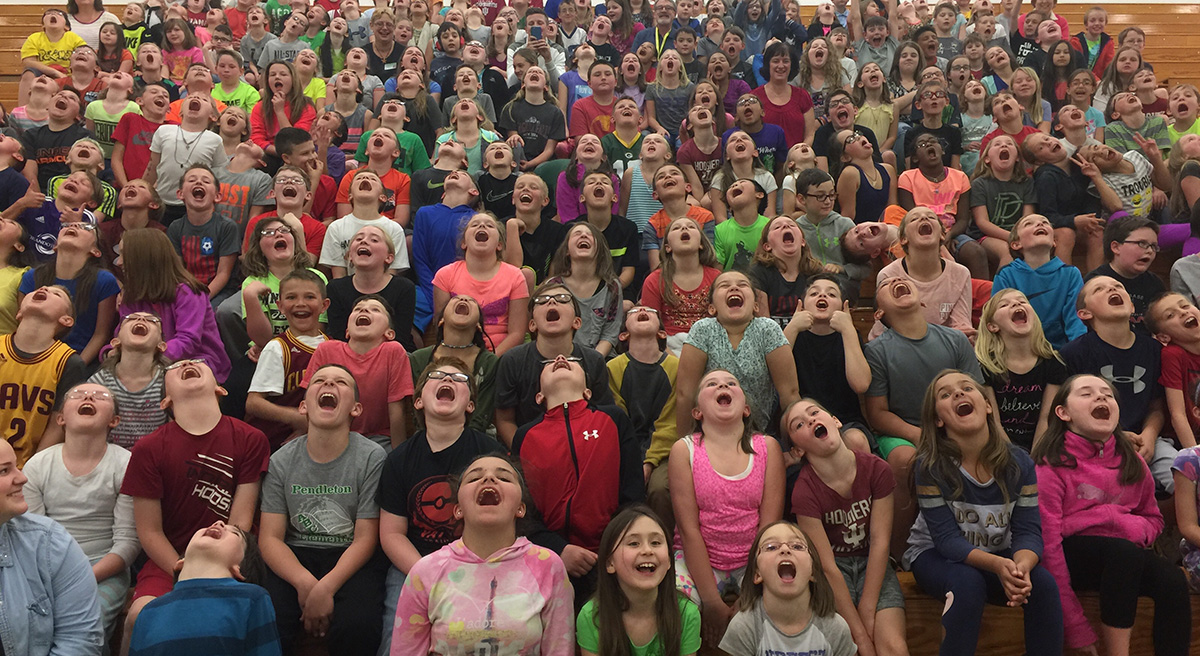
This is the first in a series of blog posts designed to encourage novelty entertainers and performers to consider elementary school shows as a viable avenue for their craft and a steady income stream.

But first, allow me to introduce myself. I’m Doug Scheer, and my wife and I have been working in elementary schools presenting educational assembly shows for 35 years. We perform twelve different educational school shows in elementary schools in the Midwest and New England states. Our topics range from character education programs to curriculum-based shows in math, science, history, reading and more. We’ve been blessed with success, performing in nearly 250 schools each year. During covid’s closure, we maintained our schedule by building a streaming studio in our home and expanding our market virtually, performing shows in every domestic time zone and even broadcasting a show to a school in Hong Kong.
So, you may wonder why this man would want to encourage others to seek success in schools? Wouldn’t that hurt his business? And the answer is no.
Having performed in schools for over three decades, I’ve come to realize that I get booked best when I try to raise the bar and challenge others to reach it. The most devastating thing affecting the school show performer market is the influx of performers who simply don’t understand why they’re actually being hired or what their job actually is.
If schools keep hiring performers who aren’t up to par, they’ll stop spending their money on school shows. If teachers complain that a school performance wasn’t worthwhile, they’ll hesitate to schedule more performances. So it’s in our vested interest to help others create and perform shows that are top notch and at a level which translates into more work for everyone.
Teachers have more and more tasks to accomplish each year, so out of class time is precious. They don’t want to waste it on poor assembly performances.
For the sake of brevity, I’ll only address the first point in this blog.
When the PTA or principal of a school decides to treat the students to an assembly show, sometimes all they want is entertainment. Some school performances are put on just for fun or as a reward for good behavior. In such cases, it’s usually easy for the performer to fulfill the client’s wishes. Magicians, dancers, ventriloquists and musicians can do what they do best, entertain. Teachers and students get a much-needed break, and when enjoying a show as a large group, the assembly show gathering can provide a sense of community.
However, due to dwindling budgets, assembly shows that are booked solely for entertainment are rare. To be successful in the school assembly market, a performing artist must change their mindset before even considering a career as an elementary school performer.
The first rule of effective communication is to know your audience. While this means that a school show performer must tailor his message to the intellect and maturity of the children, it also means that he must know what the audience expects. In the case of school shows, the audience expects to learn. After all, they’re in school and that is where learning takes place. So to be successful in schools, a performer must first know why they’re being hired. Yes, you’re expected to be entertaining, but your form of entertainment (puppets, singing, magic, dancing, etc.) should only be the means to get the message across. The lessons you teach are of utmost importance. You are a teacher first and an entertainer second. If students have learned valuable lessons AND are entertained, you’ll be successful in the business of school performances.
That’s it. It’s simple but worth some serious consideration even before putting pen to paper to create a school show or adapt an existing show that’s valuable to your clients.

The next blog in this series will address the issue of understanding children and the best ways to get them to best behave in an assembly show setting.
If you’d like to learn more about how to create educational lessons that are both lesson-filled and entertaining, please check out our books and DVD set, Entertaining Education, A Comprehensive guide to Creating and Performing Educational Magic:
And if you’re a PTA or a PTO member or the principal of a school and found yourself reading this, please learn more about the 12 different shows we offer: